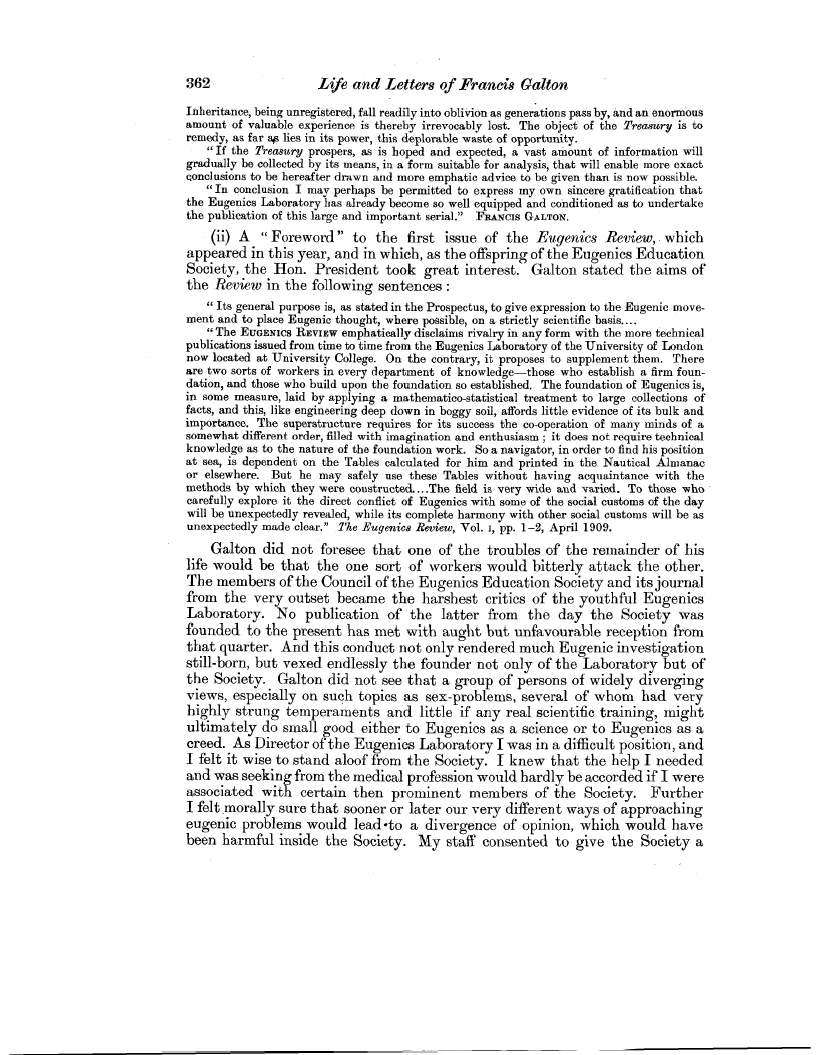| ||||||

OCR Rendition - approximate
362 Life and Letters of Francis Galton Inheritance, being unregistered, fall readily into oblivion as generations pass by, and an enormous amount of valuable experience is thereby irrevocably lost. The object of the Treasury is to remedy, as far a!s lies in its power, this deplorable waste of opportunity. "If the Treasury prospers, as is hoped and expected, a vast amount of information will gradually be collected by its means, in a form suitable for analysis, that will enable more exact conclusions to be hereafter drawn and more emphatic advice to be given than is now possible. " In conclusion I may perhaps be permitted to express my own sincere gratification that the Eugenics Laboratory has already become so well equipped and conditioned as to undertake the publication of this large and important serial." FRANCIS GALTON. (ii) A "Foreword" to the first issue of the Eugenics Review, which appeared in this year, and in which, as the offspring of the Eugenics Education Society, the Hon. President took great interest. Galton stated the aims of the Review in the following sentences " Its general purpose is, as stated in the Prospectus, to give expression to the Eugenic movement and to place Eugenic thought, where possible, on a strictly scientific basis.... "The EUGENICS REVIEW emphatically disclaims rivalry in any form with the more technical publications issued from time to time from the Eugenics Laboratory of the University of London now located at University College. On the contrary, it proposes to supplement them. There are two sorts of workers in every department of knowledge-those who establish a firm foundation, and those who build upon the foundation so established. The foundation of Eugenics is, in some measure, laid by applying a mathematico-statistical treatment to large collections of facts, and this, like engineering deep down in boggy soil, affords little evidence of its bulk and importance. The superstructure requires for its success the co-operation of many minds of a somewhat different order, filled with imagination and enthusiasm ; it does not require technical knowledge as to the nature of the foundation work. So a navigator, in order to find his position at sea, is dependent on the Tables calculated for him and printed in the Nautical Almanac or elsewhere. But he may safely use these Tables without having acquaintance with the methods by which they were constructed... .The field is very wide and varied. To those who carefully explore it the direct conflict of Eugenics with some of the social customs of the day will be unexpectedly revealed, while its complete harmony with other social customs will be as unexpectedly made clear." The Eugenics Review, Vol. i, pp. 1-2, April 1909. Galton did not foresee that one of the troubles of the remainder of his life would be that the one sort of workers would bitterly attack the other. The members of the Council of the Eugenics Education Society and its journal from the very outset became the harshest critics of the youthful Eugenics Laboratory. No publication of the latter from the day the Society was founded to the present has met with aught but unfavourable reception from that quarter. And this conduct not only rendered much Eugenic investigation still-born, but vexed endlessly the founder not only of the Laboratory but of the Society. Galton did not see that a group of persons of widely diverging views, especially on such topics as sex-problems, several of whom had very highly strung temperaments and little if any real scientific training, might ultimately do small good either to Eugenics as a science or to Eugenics as a creed. As Director of the Eugenics Laboratory I was in a difficult position, and I felt it wise to stand aloof from the Society. I knew that the help I needed and was seeking from the medical profession would hardly be accorded if I were associated with certain then prominent members of the Society. Further I felt morally sure that sooner or later our very different ways of approaching eugenic problems would lead •to a divergence of opinion, which would have been harmful inside the Society. My staff consented to give the Society a
|